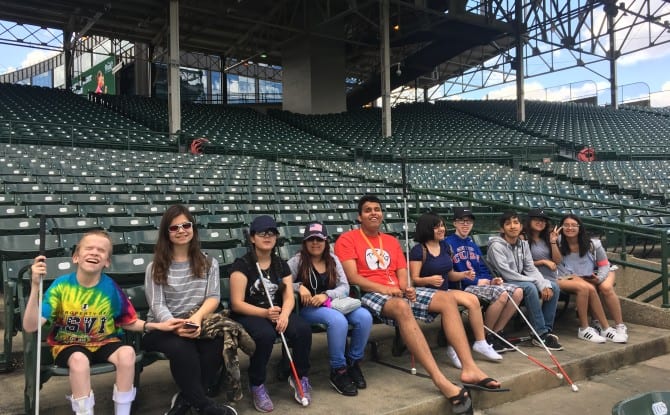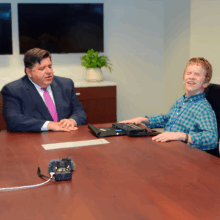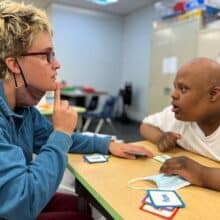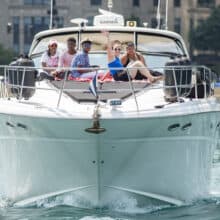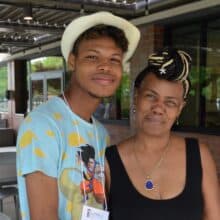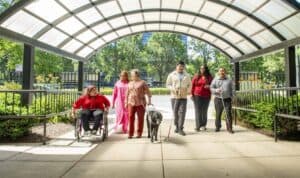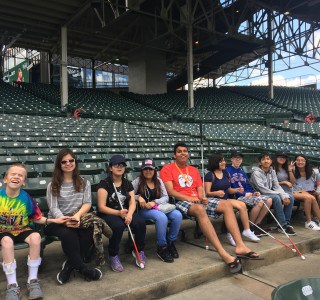
Guest Post: 2017 Summer in the City
Last month, The Lighthouse held its second annual Summer in the City program for teenagers who are blind or visually impaired. Our very own Tyler Bachelder, who is currently an intern in the public relations department, caught up with the participants. Tyler shares his reflections about this week-long program in today’s guest post. Now, let’s hear from Tyler!
On June 25, 10 teenagers from Chicago’s suburbs came to The Lighthouse to spend a week laughing, learning, and laying a foundation for future success. The Summer in the City program guides teens who are blind or visually impaired through a range of activities that will prepare them for a transition to independent adulthood. From a guided tour of Wrigley Field to lessons in self-defense, cooking classes to rock climbing, Summer in the City is a holistic crash course that helps develop confidence and breaks barriers. I spent some time with the kids, interns, instructors, and Shelle Hamer, the director of the program to get a sense of its impact.
Shelle has been in the disability field for the last 35 years, and has done everything from educating to administrating, all related to the needs of people who are blind or deaf blind. As the Manager of Children and Youth Enrichment Programs at The Lighthouse, she oversees Summer in the City. Her goals for the program are straightforward. She wants to establish confidence and independence in teens. The participants stay in dorms provided by the University of Illinois at Chicago, so they are residentially located for the duration. Mornings are spent in classes that teach concrete skills, like orientation and mobility, cooking, self-defense and technology. Afternoons are for adventure! A broad scope of activities take the kids out into Chicago to explore, play, and learn.
Shelle told me that the variety of activities is just as important as their content, because it allows the kids to be gently tested in as many situations as possible.
“If you don’t experience something, you don’t really understand it,” she says.
And this is true. Many of the participants have limited travel skills. In some cases, they may not have even traveled out of their home or neighborhood independently before. They toured Wrigley Field and Shedd Aquarium, climbed a 43-foot climbing wall, ate at restaurants, and more. The whole time, they traveled independently and used Chicago’s world-class public transit.
You might assume that these experiences intimidated the kids. Perhaps they did, initially. But in my time with them, I saw a bunch of enthusiastic, excited, exuberant teenagers thrilled to be somewhere new. They quibbled back and forth over lunch about Wifi problems, teased each other, talked about what they’d been learning, and laughed, a lot. In short, they acted like normal kids in the process of growing up.
I’ve been a self-sufficient blind person for a long time. In fact, sometimes I think it’s been long enough that I’ve lost touch with what it must be like to be wide-eyed and curious. What I saw with the kids over the course of the program was that wide-eyed curiosity, writ large.
This is exactly what Shelle desires for the program! She says that transitional programs for blind and visually impaired teenagers are vital. The skills they need to be successful adults don’t change from blind teenager to sighted, but the methods do. Summer in the City provides a structured and safe environment with just enough flexibility to let the kids explore and test those methods. It’s cane, not car, if you will. But it’s meant to demonstrate that independence is not only possible, but desirable.
One participant, Lucio Delgado, embodies this ideal in his personal story. He immigrated to the United States from Mexico four years ago. When he lived back home, he didn’t have or use a cane. He told me, grinning and laughing as he spoke, that he used to wait at street corners for the sounds of traffic to die down, whereupon he would sprint across the street in the intervening silence. To some this may seem harrowing, but to me it’s a person determined to find solutions rather than problems. With the help of The Lighthouse, his solutions will be much less dangerous.
Beyond confidence from within, the program also offers opportunities for the kids to witness it from without.
“I like having the kids interact with successful visually impaired people,” Shelle says. She refers to the opportunities the program offers for interacting with blind adults that have already achieved self-sufficiency. Seeing is believing, after all. Several of the instructors are blind or visually impaired themselves, and The Lighthouse is full of blind people working alongside sighted ones.
We’re grateful to have hosted these bright, inquisitive young students! The Lighthouse strives to promote independence, and by seeking us out, they’ve taken an important first step in that regard. Here’s to Summer in the City, and many more summers to come! If you or someone you know is interested in the program, you can find out more here.

Sandy Murillo works at The Chicago Lighthouse, an organization serving the blind and visually impaired. She is the author of Sandy’s View, a bi-weekly Lighthouse blog about blindness and low vision. The blog covers topics of interest to those living with blindness and vision impairments. Being a blind journalist and blogger herself, Sandy shares her unique perspective about ways to live and cope with vision loss.

